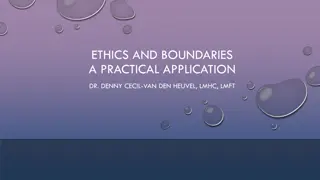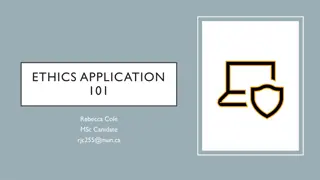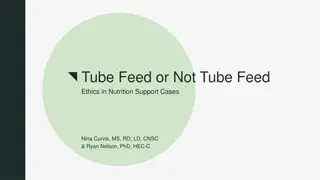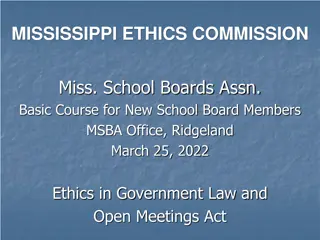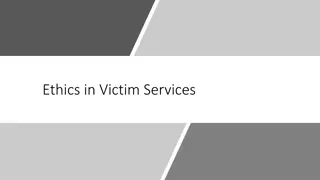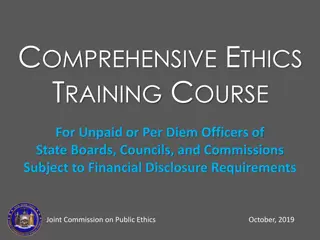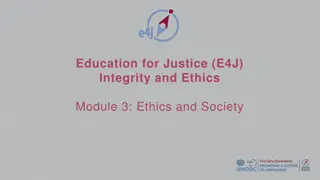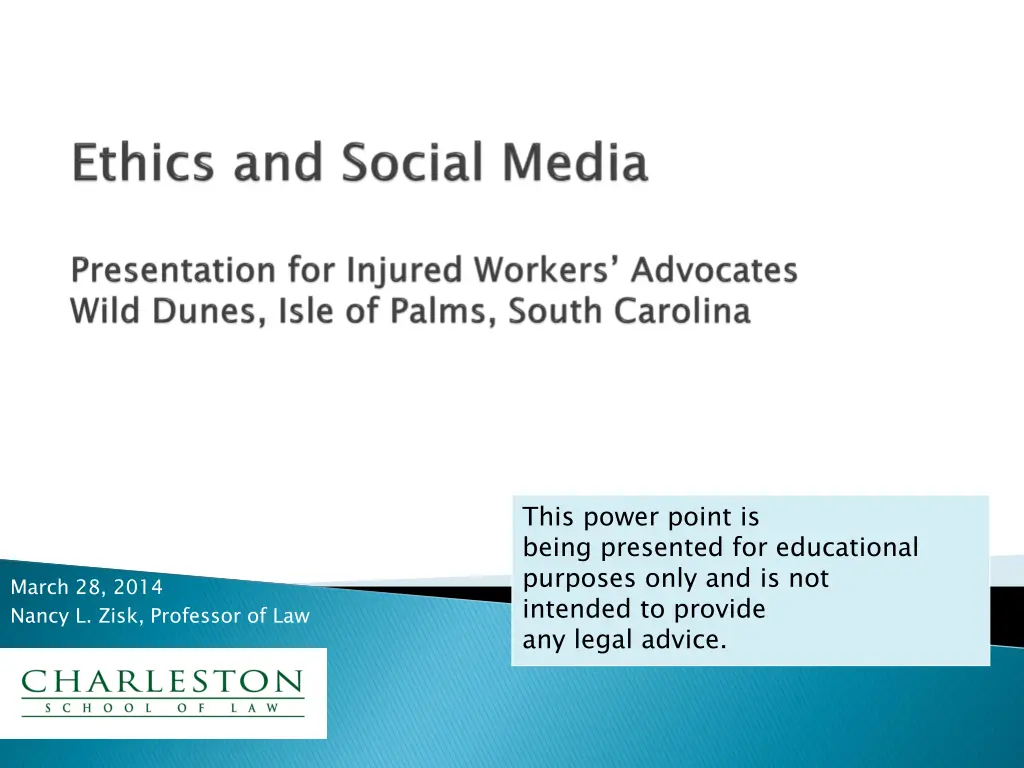
Ethical Considerations for Lawyers Using Social Media
Understand the ethical implications of lawyers using social media for promotion and communication. Learn about guidelines, rules, and best practices to ensure compliance with legal standards while leveraging social media effectively in the legal profession.
Download Presentation

Please find below an Image/Link to download the presentation.
The content on the website is provided AS IS for your information and personal use only. It may not be sold, licensed, or shared on other websites without obtaining consent from the author. If you encounter any issues during the download, it is possible that the publisher has removed the file from their server.
You are allowed to download the files provided on this website for personal or commercial use, subject to the condition that they are used lawfully. All files are the property of their respective owners.
The content on the website is provided AS IS for your information and personal use only. It may not be sold, licensed, or shared on other websites without obtaining consent from the author.
E N D
Presentation Transcript
This power point is being presented for educational purposes only and is not intended to provide any legal advice. March 28, 2014 Nancy L. Zisk, Professor of Law
Advertisements Certification/expertise claims Judge/lawyer relations Solicitation of clients
Pros: Stay connected with friends and family Network with colleagues Raise profile Promote services/events Keep clients informed Connect with new clients Cons: What happens on the internet, stays on the internet!
Preamble: [5] A lawyer s conduct should conform to the requirements of the law, both in professional service to clients and in the lawyer s business and personal affairs.
Statistics suggest that your clients are using social media, such as LinkedIn, more than you are. Part of the reluctance among lawyers relates to ethics-related concerns.
RULE 7.1: COMMUNICATIONS CONCERNING A LAWYER'S SERVICES RULE 7.1: COMMUNICATIONS CONCERNING A LAWYER'S SERVICES A lawyer shall not make false, misleading, or deceptive communications about the lawyer or the lawyer's services.
(a) contains a material misrepresentation of fact or law, or omits a fact necessary to make the statement considered as a whole not materially misleading; (b) is likely to create an unjustified expectation about results the lawyer can achieve, . . .; (c) lawyers' services, unless the comparison can be factually substantiated; (c) compares the lawyer's services with other
I win 90% of my cases Probably not permissible I have successfully represented several Fortune 500 companies in patent infringement cases Probably permissible (if true) Blogging only about your wins Probably not permissible (without disclaimer) Hunter v. Virginia State Bar (Va. 2013)
(e) contains a nickname, moniker, or trade name that implies an ability to obtain results in a matter. (e) contains a nickname, moniker, or trade name that implies an ability to obtain results in a matter. Millions, Billions, Zillions, LLC
Lawyer Advertising: The Past
Promotes itself as the worlds largest networking site. Very helpful: Raising your profile on the Internet Keeping clients informed Attracting new clients
February 2013, the South Carolina bar: Does an endorsement serve as an expression of a lawyer s expertise? Even though the endorsement is made by a third party (that you cannot take down)
An endorsement by a third party may be viewed as an expression of certification or specialty in an area of law. Only lawyers who have completed the South Carolina Certification process may make such claims.
(a) A lawyer who is certified . . . is entitled to advertise or state publicly that the lawyer is certified as a specialist in the pertinent specialty field . (b) A lawyer who is not certified as a specialist shall not contain any form of [an advertisement] the words certified, specialist, expert, or authority .
Attorneys who are not certified may advertise that they focus on a particular area or are willing to accept certain cases, But Stay away from words like certified specialist expert authority
(d) lawyer (1) without identifying the fact that it is a testimonial or endorsement; (2) for which payment has been made, without disclosing that fact; (3) which is not made by an actual client, without identifying that fact; and (4) which does not clearly and conspicuously state that any result the endorsed lawyer or law firm may achieve on behalf of one client in one matter does not necessarily indicate similar results can be obtained for other clients. (d) contains a testimonial about, or endorsement of, the
A colleague offers to endorse your skills in an area you don t know well (e.g., intellectual property). A friend offers to endorse your skill in the area of legal analysis on LinkedIn. You believe you have this skill, but your friend has never used your services or worked with you.
A judge compliments you? Based upon my observations of him in court there's no question in my mind that he is in the upper echelon of employment lawyers in this state ... Can you use it to advertise? At least one court says NO! The judge is not personally endorsing the attorney or making a public statement about the attorney for advertising purposes. In fact, judges are expressly prohibited from endorsing attorneys or providing testimonials regarding attorneys. Dwyer v. Cappell , (D.N.J. 2013).
A lawyer shall not make false, misleading, or deceptive communications about the lawyer or the lawyer's services.
Avoid the temptation to disclose! The public defender who blogs about her cases Marketing using your clients identities Uploading client documents
Liking protected by the First Amendment. Bland v. Roberts (4th Cir. 2013) A sheriff s employee was fired from his job for liking the Facebook page of the opposing candidate. When the sheriff was reelected, he fired the employee. 4th Circuit held this violated the First Amendment But . . .
Prevents the disclosure of information Attorneys must act competently to preserve confidentiality Applies to current and former clients
Law Firm Friends and Family
ABA Standing Comm. On Ethics and Prof. Resp., Formal Op. 462 (2/21/13): A judge may participate in electronic social networking ( ESM ), but as with all social relationships and contacts, a judge must comply with relevant provisions of the Code of Judicial Conduct and avoid any conduct that would undermine the judge s independence, integrity, or impartiality, or create an appearance of impropriety.
ABA Standing Comm. On Ethics and Prof. Resp., Formal Op. 462 (2/21/13) SC Advisory Opinion 17-2009 A magistrate judge may have ESM relationship with lawyers as long as they do not discuss anything related to judge s judicial position.
Other States? California: Not ok to include in social network lawyers who have case pending before judge Florida: Not ok to include in social network lawyers who appear before or allow lawyers to add judge to their social network Kentucky: Judges should be mindful of whether social network connection requires disclosure of recusal New York: Exercise discretion and stay abreast of new features that may impact judicial duties. Ohio: Ok, so long as it comports with ethical rules. Other States?
Rules Governing the Judiciary, Employees of the Judicial Department, and Others Assisting the Judiciary 501 Code of Judicial Conduct Canon 1: A Judge Shall Uphold the Integrity Independence of the Judiciary Canon 2: A Judge Shall Avoid Impropriety Appearance of Impropriety in All of the Judge's Activities Canon 3: A Judge Shall Perform the Duties Judicial Office Impartially Canon 4: A Judge Shall So Conduct the Judge's Extra Conflict With Judicial Obligations Rules Governing the Judiciary, Employees of the Judicial Department, and Others Assisting the Judiciary 501 Code of Judicial Conduct Uphold the Integrity and Avoid Impropriety and the Perform the Duties of Impartially and Diligently Extra- -Judicial Activities Judicial Activities as to Minimize the Risk of
Rule: Lawyers cannot solicit professional employment from prospective clients. Except when. . . The person contacts is a lawyer or Has a family, close personal, or prior professional relationship with the lawyer.
Model Rule 1.18(a) A person who consults with a lawyer about the possibility of forming a client- lawyer relationship with respect to a matter is a prospective client.
A consultation is likely to have occurred if a lawyer specifically requests or invites the submission of information-- without clear and reasonably understandable warnings and cautionary statements that limit the lawyer s obligations, and a person provides information in response.
A consultation does not occur if a person provides information to a lawyer in response to advertising that merely describes the lawyer s education, experience, areas of practice, and contact information, or provides legal information of general interest.
Model Rule 1.18(c): A lawyer cannot represent a client with interests materially adverse to those of a prospective client in the same or substantially related matter if the information received from the prospective client could be significantly harmful. Model Rule 1.18(d): Disqualification is imputed to the whole firm, unless the affected lawyer is screened and other requirements are satisfied.
https://encrypted-tbn2.gstatic.com/images?q=tbn:ANd9GcS9eEjj4V7XpKHxxh-9u6S5UcXMn3jnkDFJFIXD_7FfjBnsXeTUhttps://encrypted-tbn2.gstatic.com/images?q=tbn:ANd9GcS9eEjj4V7XpKHxxh-9u6S5UcXMn3jnkDFJFIXD_7FfjBnsXeTU

